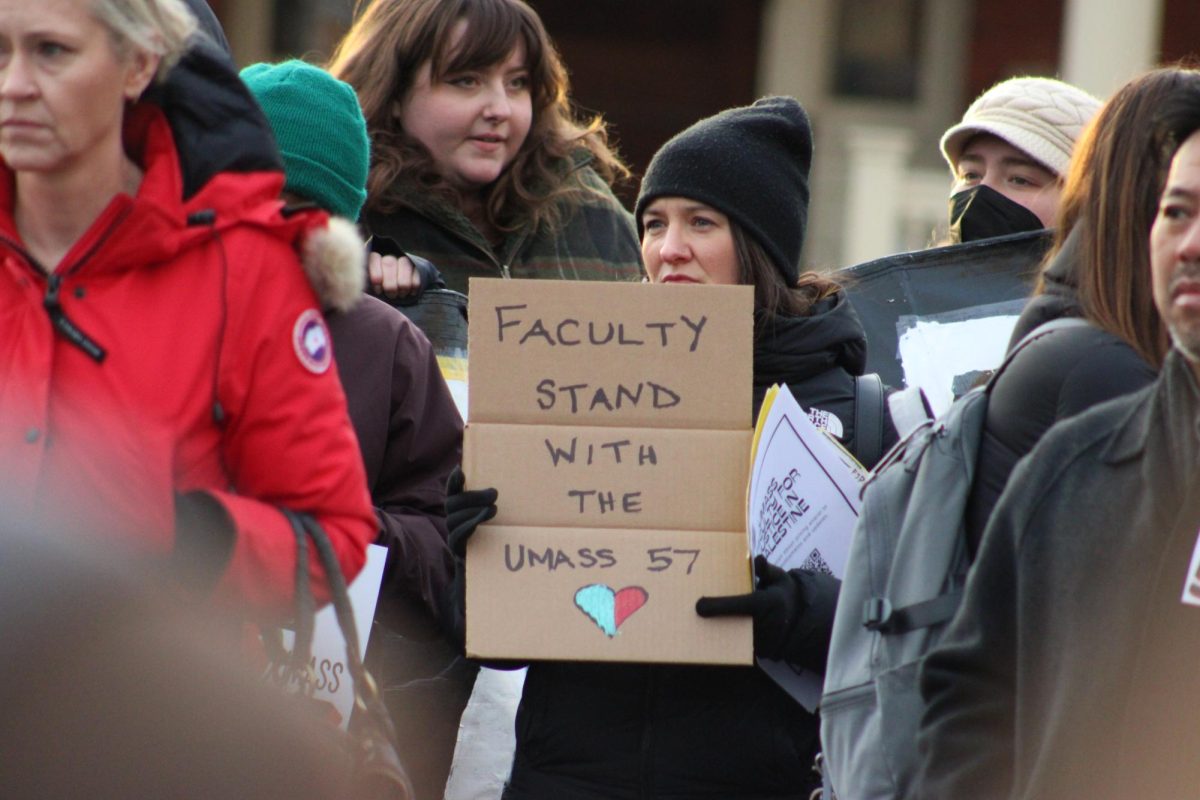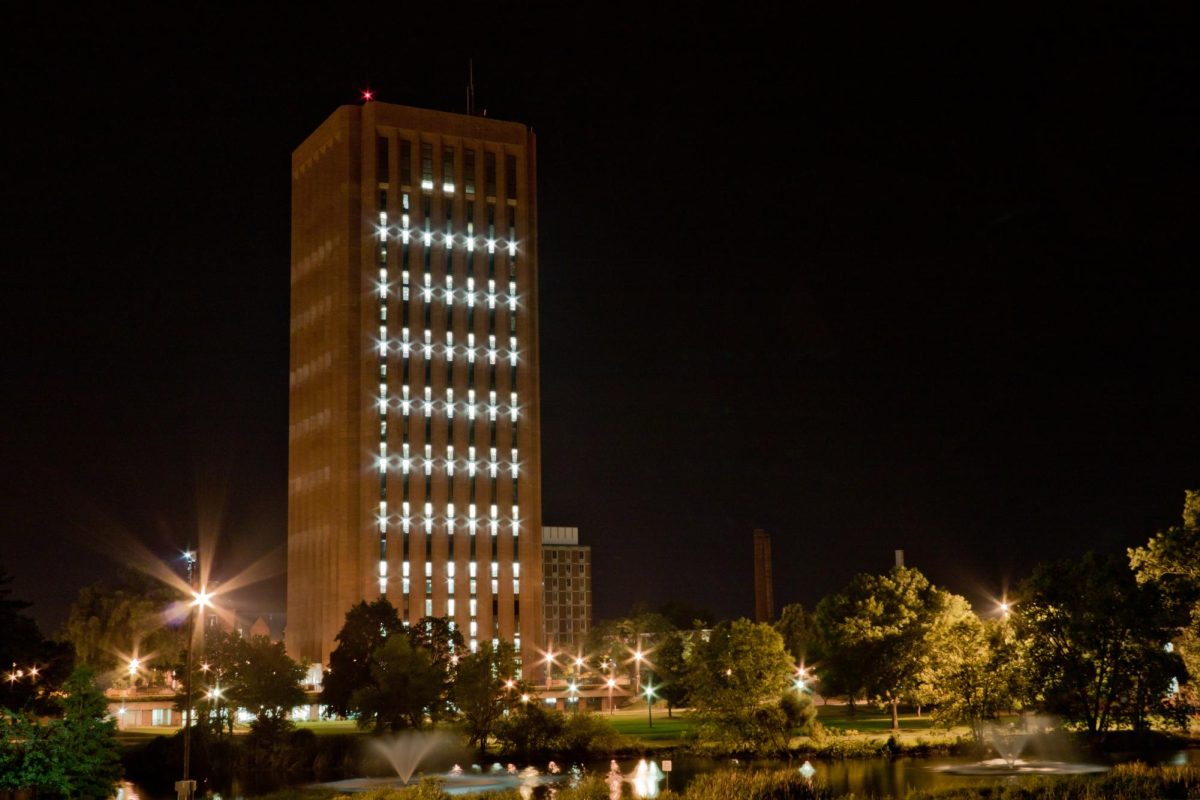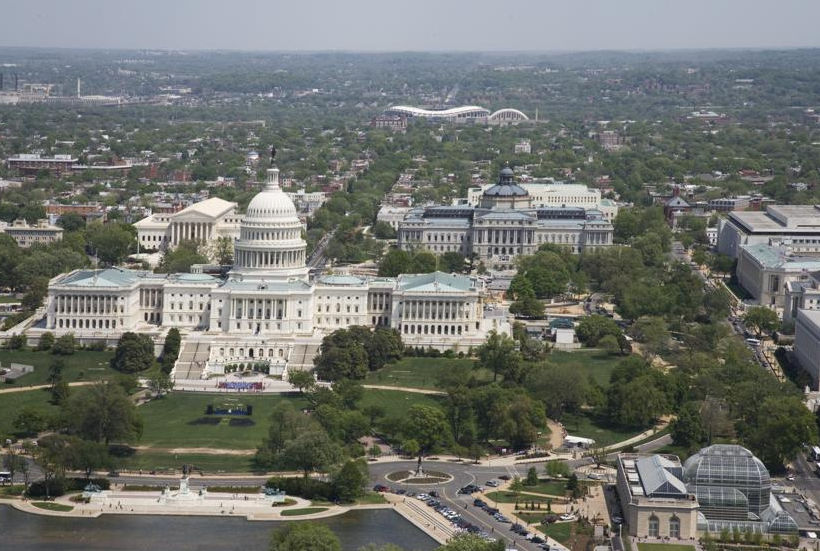Dear Editor,
Every day I eat at least one meal in the campus center. If I purchase a meal, drink, maybe a piece of fruit or bag of chips, there is no way to do this without a tray. So, I put things down because I can’t hold all of it. I’m also not about to wait in those long lunch-time lines twice.
Many of my fellow students feel the same way.
You may think Dining Services is saving money, but you are losing a significant amount of revenue in lost sales. It’s not helping the profit margin.
To say it is to prevent waste or to save money is ridiculous. The cost to students for food in campus center is equal to or in some cases greater than off campus. So, where is the savings from this trickling down other than to the university and third party contractors?
Keith Dahlke
School of Public Health
Dear Editor,
The editorial page on Wednesday November 18, 2009 was a delight for this student of civil rights and liberties. It contained a rich mix of commentary on the meaning of free expression on this campus. I feel fortunate to be a part of that dialogue. However, I would like to comment on the difference, for me, between the abstract notion of free expression and opinion on specific expression.
Free expression is valuable. It is enshrined in the Constitution and it is part of the enlightenment tradition that produced American institutions like open government, periodic elections and jury trials. And, in addition, the University is a place where speech has special protection because we do our best work when we are not afraid to speak.
On the other hand, we should engage the content of speech and not simply retreat to an abstract assertion that everyone has a right to say whatever they want. Free expression is really only valuable if we engage with what is said. Alana Goodman is right, the case of Andrew Card has parallels with that of Luc Levasseur. But it is not exactly the same.
In fact, one of the sillier parts of the discussion last week was the suggestion that, by letting Levasseur speak, the University would be endorsing terrorism. The University was not endorsing the views of Levasseur. As the Daily Collegian editorial points out, the Levasseur speech should have been protected in the interest of inquiry rather than advocacy. I think the police who protested had some sense of this with their silent vigil, although their signs and back room pressure said otherwise. I wish our administration had been clearer that we need to protect inquiry in the face of political pressure.
The case of Andrew Card was different because the University was indeed endorsing Card’s work, which included planning and advocating the American invasion of Iraq. Like many members of the University community, I opposed that award. But I was also aware that the expression of opposition to Card was a matter of considerable debate. It was a debate that had as one of its core values, freedom of expression.
John Brigham
UMass professor of political science






Ed • Nov 21, 2009 at 5:10 am
the demonstrators clearly had the right to disrupt the event in the way they did under state and federal law. The 1st amendment protects your right to speak, but does not give you the right to be heard. That means that if people disagree with what you are saying, and they can shout louder than you, then that is their right
No, it isn’t. And to carry this to its logical extreme, would “their right” to “shout” that the building was on fire? Particularly if the building had been built in the 19th Century instead of the 20th and was made of wood and hence where fire would have been more of an imminent threat than in the largely inflammable Student Union?
SCOTUS Justice Brandeis answered this with his famous statement that the First Ammd does not include the “right to shout ‘fire’ in a crowded theater.” And this is clearly established as an interpretation as limits on free speech.
To preserve public order, prevent chaos – and frankly, prevent violence and mahem (think an irate UMRC member hauling off and slugging a protester to shut him/her/it up), the government can (and routinely does) restrict speech in terms of time, place and manner. This is legal as long as it is done in a content neutral manner.
For example: I am typing this at 3:45 AM – UMass can (and does) restrict my right to instead scream this out the window at the top of my lungs, but it does so in a “content neutral manner” in that the restriction is on time/place/manner (screaming in the middle of the night) and not on the content of my screaming, and further that it applies equally to absolutely everyone. And SCOTUS has even taken this to the point where (I think it was) Portsmouth, NH could require that all newspaper vending boxes be painted a certain shade of brown to match the decor of a renovated downtown, as long as it required that all of them be painted that color.
Now under Federal law, it is a crime for two or more people to conspire to deny a third his/her/its lawful rights. So while it is one thing for random lefties to just start screaming on thier own, when there is an organized effort to do so (when there is a girl in a wheelchair in the lobby coordinating all of it via cell phone, including canceling planned aspects of the event “because there are a lot of cops here”) then you have a conspiracy. A criminal conspiracy that is in violation of laws designed to prevent the KKK from doing this sort of thing, but which apply to everyone.
And Massachusetts law is explicit:
Massachusetts General Law Chapter 272, Section 40 states that “[w]hoever willfully interrupts or disturbs a school or other assembly of people met for a lawful purpose shall be punished by imprisonment for not more than one month…”
Now Massachusetts, being nearly 400 years old, has some funky old laws on the books (including at least two sodomy statutes) but 272 MGL 40 is “good” law in that the Cambridge Police routinely arrest folk that disrupt Harvard events and the UMPD should have arrested the troublemakers who disrupted the Feder event.
In fact, as sworn peace officers are sworn to keep the peace, the UMPD’s failure to intervene at the Feder event was, itself, a violation of law. Much like Lisa Kidwell’s failure to prevent the violent theft (technically “robbery”) of 200 copies of the Minuteman Newspaper was a violation of her sworn duties.
And the “equal protection” aspect of this that no one is thinking about is when the same Lisa Kidwell then arrests the editor of said newspaper less than 48 hours later, well…..
The “equal protection” aspect of this that no one is thinking about would have been if upset conservatives had disrupted the LukeyBoyLovefest in a manner and via means identical to which the Feder event was disrupted, it would be an “equal protection” issue if they were to be prosecuted or punished. And this is the point that those running this university fail to understand: if you let the radical left run wild with impunity, you become legally obligated to let everyone else equally run loose with equal impunity.
And you have no more right to disrupt a lawfully-assembled public assembly than you do to pull the fire alarm.
students dad • Nov 19, 2009 at 11:47 pm
John Brigham
UMass professor of political science
Simply put, Lavessuer or the other criminals invited were not necessary to the “inquiry”. A study of all elements surrounding the sedition trial and lavesseur’s commentary on social justice could have been delivered without putting Lavesseur and his Domestic terrorists on an academic podium or high pedestal to be worshiped on campus. Many violent criminals liked lavesseur are studied by professionals like yourself and then papers published and speeches given.
I DO NOT SEND MY SON TO UMASS TO BE TAUGHT BY CRIMINAL MASTERMINDS BUT TO BE TAUGHT BY THE PRESTIGEOUS PROFESSORS LIKE YOURSELF. YOU ARE MY PREFERED ROLE MODEL, WHEN COMPARED TO THE ALTERNATIVE LIKE MEMBERS OF THE UFF.
Zack • Nov 19, 2009 at 7:22 pm
Well said Ben, well said…
Ben Rudnick • Nov 19, 2009 at 11:26 am
Alana wrote yet another excellent piece here, but I must disagree with her, and Ed, in one respect. Don Feder’s freedom of speech was not violated by the protesters that shouted him down. In fact, what occurred in that case was a violation of the University’s picketing policy. That actually makes the matter more troubling, not less, because the University officials who were present at the Feder event, including several police officers, knew that the demonstrators were violating University policy and did nothing to stop it. The only enforcement I witnessed that day was a girl who had brought in a ferret being asked to leave for violating the “no pets” policy. In fact, not only did the officials there not enforce the picketing policy, they contended that there was nothing they could do as long as the protestors did not actually break any laws.
The Feder event was a travesty because the University callously failed the give him the equal protection of its picketing policy. Article 3 of that policy states that demonstrators are prohibited from “presenting obstacles to regular university activities” which includes “sounds that prevent normal aural communication.” Anyone at the Feder event knows that the demonstrators there violated this provision in shouting him down, and yet the University did nothing. Article 5 of the picketing policy explicitly states that students shall not “intentionally and substantially interfere with the freedom of expression of another person on university premises,” and the demonstrators blatantly violated this rule as well, and still the University did nothing.
In reality, the demonstrators clearly had the right to disrupt the event in the way they did under state and federal law. The 1st amendment protects your right to speak, but does not give you the right to be heard. That means that if people disagree with what you are saying, and they can shout louder than you, then that is their right. But the whole point of UMass having a picketing code is to establish a higher standard than that of the 1st amendment. The idea is to create a space where people not only have the right to speak, but also the right to be heard. The goal of these policies is to create an environment such as the one Prof. Brigham envisions because “we do our best work when we are not afraid to speak.”
The failure of the University to apply these rules with an even hand is very troubling to me, and I only hope that the administration will learn from the many controversies in this area over the past few years. I personally witnessed their failures in the Feder event, and based on the reports I have read about the Andrew Card affair, it sounds like they failed to live up to their responsibilities there as well. I only hope that, going forward, the University will ensure that everyone on this campus has the same right to speak and be heard so that our campus will truly be a safe haven for debate and academic exploration.
Ben Rudnick
Collegian Columnist
Ed • Nov 19, 2009 at 2:20 am
If anyone wants to see the legitimacy of Alana’s argument, John Brigham has clearly presented it.
How, exactly, is one university official inviting Card and another university official inviting Levasseur? What exactly is the difference between giving an honorary degree to Andrew Card (for getting money for UMass) and UMass Boston giving one to John Kerry (for getting money for UMass) the very next day?
Sorry folks, how is this different?
And Dr. Brigham, where were you after the Feder Fiasco? That one different too? Alana is, again, right.